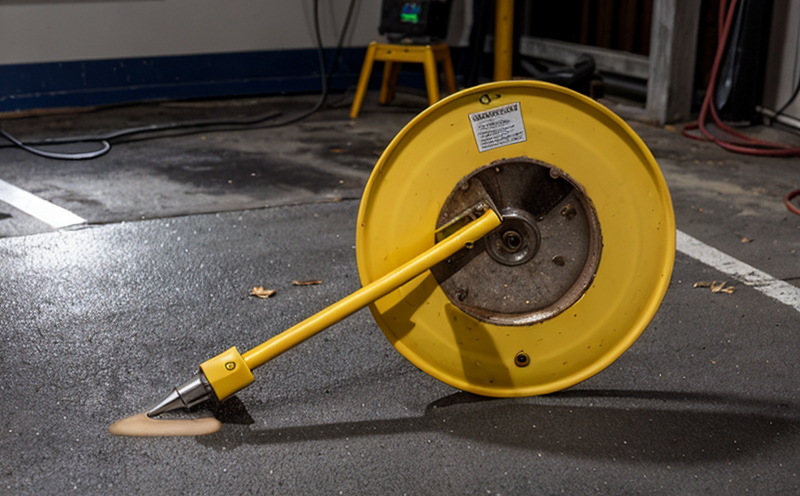ISO 23277 Acceptance Levels for Penetrant Testing
The ISO 23277 standard provides acceptance levels and guidelines for penetrant testing in additive manufacturing (AM) and 3D printing. This non-destructive evaluation method is essential to ensure the integrity of parts produced by AM processes, which are increasingly used across various sectors including aerospace, automotive, and medical devices.
Penetrant testing involves applying a liquid that seeps into surface-breaking flaws. After drying, any remaining liquid on the flaw's edges indicates the presence of defects. This test is particularly useful for identifying cracks or other imperfections in complex geometries produced by AM processes like laser powder bed fusion (LPBF) and electron beam melting (EBM).
The ISO 23277 acceptance levels are critical because they define what constitutes an acceptable level of flaw indication. These levels are based on the size, location, and severity of defects that can affect part functionality or safety. The standard specifies different classes for acceptance levels to cater to various industries' needs.
For instance, aerospace parts might require a more stringent class due to their critical nature, while automotive components may have less stringent requirements. Understanding these differences is crucial when selecting the appropriate acceptance level for your specific application.
The standard also provides guidance on specimen preparation and testing procedures. Specimens must be cleaned thoroughly before testing to ensure accurate defect detection. The process involves applying penetrant, allowing it to penetrate defects, removing excess penetrant, applying developer, and finally inspecting the part.
Accurate reporting is paramount in AM quality assurance. The report should include details such as the type of material used, the specific AM process employed, the acceptance level applied, and a comprehensive description of any defects detected along with their location and size.
| Class | Description | Application |
|---|---|---|
| A | Tolerable defects, no action required | Less critical parts |
| B | Defects requiring repair or rejection | Moderately critical parts |
| C | Severe defects necessitating immediate rejection | Critical parts, such as aerospace components |
The acceptance levels are designed to help manufacturers and quality assurance teams make informed decisions about part acceptability. By adhering to these standards, companies can ensure that their AM processes produce high-quality products that meet the required safety and performance standards.
In summary, ISO 23277 is a vital tool for ensuring the integrity of parts produced through additive manufacturing techniques. Its acceptance levels provide clear guidelines on what defects are acceptable or unacceptable, thereby helping to maintain quality control in this rapidly growing sector.
Why It Matters
The importance of ISO 23277 cannot be overstated, especially given the increasing reliance on AM technology. The standard ensures that parts produced through these advanced manufacturing techniques meet stringent quality and safety standards. This is particularly important in sectors like aerospace and automotive, where even minor defects can lead to catastrophic failures.
By using penetrant testing according to ISO 23277 guidelines, manufacturers can identify and address potential flaws early in the production process. Early detection of defects allows for timely repairs or rejections, preventing defective parts from reaching end-users. This not only enhances product reliability but also protects consumers from safety risks associated with flawed components.
Moreover, adhering to this standard demonstrates a commitment to quality and compliance. It can enhance a company's reputation and build trust with customers and regulators. In competitive markets, maintaining high-quality standards is essential for long-term success.
- Aerospace: Ensures parts meet stringent safety requirements.
- Automotive: Guarantees reliability in critical components like braking systems.
- Medical Devices: Maintains the integrity of implantable devices to ensure patient safety.
In conclusion, ISO 23277 plays a crucial role in ensuring the quality and safety of parts produced through AM processes. Its acceptance levels provide clear guidelines that help manufacturers maintain high standards throughout the production cycle.
Eurolab Advantages
Eurolab, your trusted partner for ISO 23277 compliance testing, offers unparalleled expertise in additive manufacturing and non-destructive evaluation. Our team of experienced professionals is dedicated to helping you achieve accurate results that meet the strictest industry standards.
We offer a range of services tailored to your specific needs:
- Comprehensive ISO 23277 testing for various AM processes.
- Customized specimen preparation and testing procedures.
- Detailed reporting with actionable insights for quality improvement.
Our state-of-the-art facilities ensure that you receive the highest quality results. We use advanced equipment and follow rigorous protocols to provide reliable test data. Our experienced technicians are fully trained in the latest techniques, ensuring accurate and consistent testing.
Eurolab's commitment to excellence extends beyond just meeting standards; we aim to exceed them by offering personalized support throughout your project lifecycle. From initial consultation to final report delivery, our team is there every step of the way to ensure a smooth process.
Choose Eurolab for all your ISO 23277 compliance testing needs. Trust us to provide you with the expertise and reliability you need to succeed in today's competitive market.





